
Watch the video interview on Youtube here
The Director’s Director Mark W. Travis on Creating Authentic
Acting Performances [FULL INTERVIEW]
Film Courage: Mark, on a movie a director has to know a thousand different jobs whether it be writing, story, lighting, make-up, working with actors, editing, and so on and so forth. When it comes down to it, what do you think is the most important job of a director?
Mark W. Travis: Okay…the most important job of a director is really simple if you think about it. First of all, the director of the film is a storyteller, in fact everyone he’s working with is there to help tell one story. So the director’s primary job is to be the Shepherd of that story, to take care of the story, to tell the story as clearly and honestly and authentically as possible. I say story, not the script (which we can talk about later) is a step toward getting the story told. In terms of your question (which you’re asking about of the story being told) at the center of the story, the most important part of the story, are the characters. It’s the characters who tell the story, not the cinematography, not the production design, not all those other elements. All those other elements are the support system to the story. So the director needs to be focusing on the story and then on the characters and the strength of the performances, the authenticity of the performances, the clarity of characters, the clarity of relationships, the clarity of the journey of each character, is really crucial in order to tell the story well. That’s the primary focus of a director. If a director can’t do that or loses sight of that, the story is going to start to wobble and we’ve seen that a lot. Stories wobble simply because of performance even though a lot of the other elements may be brilliant like CGI and special FX and all that stuff is beautiful. It’s wonderful. But it’s not the story.

Film Courage: Is the story wobbling because the actors are wrong for the part? When you say Shepherding the Story, where would that get lost? Where would the director in the course of let’s say a 14-hour day on set working with actors lose that? Can you give some examples of what things could happen or how things could happen?
Mark W. Travis: Okay. You brought up two things: What can happen in a 14-hour day and then you brought up a casting question. There are two questions. I’m going to go back to the casting first. First of all casting, which is really crucial and very often we’ve all seen films where we feel the casting although understandable, is not right. It doesn’t feel like that actor is bringing me closer to the character and many times that actor is a star or whatever so you can understand why. So the casting is really important so that we the audience…the goal is that we the audience lose sight of the actor and are only watching the character and many times the actor, even the power of the actor, the career of the actor or a lot of other things can get in the way of us connecting with the character. One more thing, in casting you can cast someone who seems to get to the character. It has nothing to do with star power. So casting is really important to find someone who can actually access that character.
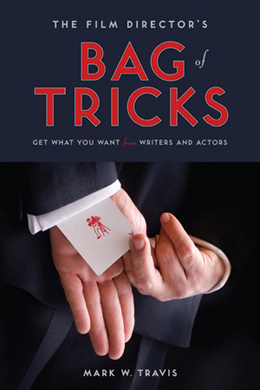
Check out Mark’s book – The Film Director’s Bag of Tricks
Now on a 14-hour day, let’s say we’re shooting a couple of scenes or one scene or whatever we’re doing in that day. You ask how a director can lose sight of the Shepherding of the Story. Very easily. Very easily. And I can tell you as a director, having directed a lot of films and having worked on a lot of films, you can see it happen. It’s what a friend of mine (Mark Rydell) who I’ve worked with a lot called The Big Machine. The Big Machine is the filmmaking process. Cameras, lights, crew, all of that, it’s huge. You’ve been on a set. You know what it’s like, it’s enormous. And the director is sort of the leader, the guy that everybody is looking to and what can happen is the director gets distracted by all the challenges, everything he has to do. I’m not saying he doesn’t have to do all of that, and can lose sight of what is most important. You’re shooting the close-up of that actress at that moment, what’s most important? The lighting? No. The background? No. The special FX? No. What’s most important is that performance.

I heard once on a set a director, after he had shot a moment, turned to the script supervisor and say “Did she say all the words?” and the script supervisor says “Yes.” And she says “Good. Okay, moving on.” His criteria was did she say all the words? Not, was that the performance we needed? In other words, can the director keep the focus on the performance because when it comes to down to the film and we see it on the screen, what do we see? The performance. The big thing that Mark Rydell told me about this is you can be on a set and watching and [think] “That was great! That was wonderful!” You can even see it in dailies and watch it later and go “Great! Wonderful!” You can see it at home later and go “Huh? What happened to great and wonderful?” The Machine has taken it away. A lot of directors get their energy from The Big Machine, from the fact that there is a crew and there are lights and energy. Everybody goes quiet. Everybody is listening. They get excited by the fact that they are shooting a film and that excitement will go away and then you look at the shot and go “Huh? I thought is was great when we did it? What happened?” What happened was there’s an energy which was around you that is now gone. So a director’s job is now can you shut down The Big Machine? Can you focus your attention onto just what that actress is doing? What she’s given to you? Can you see only that? That’s really hard.
And one other aspect of this assuming that you’ve been working with this actress a lot and you’ve rehearsed and you’ve discussed this and so you know what you’re going for. And you know what she’s going for. And you watch her in that moment not only shut down The Big Machine, but you watch her in that moment as if you’ve never seen her before and you’re seeing what she’s doing for the first time. That’s hard. That’s the hardest thing a director has to do.
_______________________________________________________________________
Question: What do you view as the most important job of a director?
_______________________________________________________________________
Film Courage: What are two or three things that a director cannot afford to get wrong because if they do, the movie is ruined?
Mark W. Travis: Wow! That’s a big question. Two or three things they can’t get wrong…
Film Courage: Right…cannot afford.
Mark W. Travis: Okay. There is one thing Karen I think is really important that I’ll include myself in this that we all fall into. A trap that we all fall into. And what I call it is the trap of assumption, okay. The trap of assumption is let’s say I have a script and I really like it. I’m moved by it, okay? My assumption would be that other people will it and be moved by it. Somebody else could read it, or see this film or whatever and could be moved by it. I could be wrong. I’ll even take a scene between a husband and wife and there is an argument going on and the husband is really angry at the wife for some reason and to me he’s angry at her because of her attitude. Her impatience. I’ve done something very small. And my assumption is that anybody watching it would get that. It may not be true. The problem is this: when we’re looking at a script, in a script, I’m just going to take one scene, I can read that scene Karen. And I can read it. Let’s say it’s just two pages, I can read that scene and say “I got it. I can see what’s happening. I can feel the energy between the two characters. I can feel the conflict. I can feel the resolution. I can feel all the obstacles. Everything that they’re going through. I get it. Now quite honestly those two pages, none of what I felt is there. I can tell you that right now. None of it. None of the conflict and even the characters is there. All it is, is words typed on a page. No different than a novel, it’s just words typed on a page. What happens which we all have to recognize is when you look at a script you project into that material what you believe is happening. Anybody who reads a script can suddenly hear the characters, they can see the characters. Where is that coming from? It’s not coming from the page. It’s not there. There’s no pictures of the characters there. There’s no action there. Nothing. There is no emotion there. No performance there. Nothing. So what we do, what every human being does is we project into those pages what we believe is happening. In other words, those pages are triggering me. Those pages that I am reading trigger Mark. Mark’s history. Mark’s life experience, Mark’s expectation. Everything. It’s coming from me. So I project into it. Now Karen, you’ll do the same thing. But why should I assume that your projection is the same as mine? That’s the danger of assumption. I’ll assume that you’ll get it the same way I do. Not true.
Maybe close? I don’t know. So the trap is the trap of assumption. I assume that you’re going to respond that way. I could see a scene and go “That’s so moving!” and you’re going “What? I don’t get it.” My reaction was, it was moving. Your reaction was that it wasn’t moving. The assumption was you should get it. Thinking that just because it works for me, it should work for everybody else. Yes, ironically, the flip side of that is also true. I as a director have to make the movie for me. I can’t make it for anybody else. So I have to allow a certain level of assumptions are going on. I’m assuming because I’ve made a movie that I really like that it is moving to me, I have to assume it is going to be moving to enough people that lots of people are going to like it. So we’re trapped in the world of assumption. But trapped in that we have to do it but be aware aware that it could be a problem.
Film Courage: Okay. So how is someone aware of their own assumptions? Let’s suppose you think that these two pages of very moving dialogue between two characters is just heart-wrenching because you see the world that way or that scene, but how are you bouncing that off someone else…I don’t know if I’m making myself clear?
Mark W. Travis: Yeah. I think so and I think I have an answer for it. Let’s stay with this one scene because sometimes just looking at one scene because a movie, you don’t just make a whole movie, as you know. You make all these little scenes put them together and it becomes a movie. So you have to be very focused, very myopic about that scene. So let’s say a scene between a husband and wife. And getting back to you, how do I deal with my assumptions. One of the biggest assumptions I as a director can have, any director, every director will have…I read the scene, I know how it should play. I, as the director know how this scene should play. Should…now I am the director so I get to decide. I get to decide how I want the actress to play the mother and how I want the actor to play the father. Now this is what a lot of directors will do and I can tell you right now because working with a lot of directors, I will say to a director who says this is how it should go and I’ll say “How do you know?” “Well, that’s clearly the way it should play” and I’ll talk to them about projection. So there is that assumption. Now we’re going to mix with that something else which makes it even more difficult. You have the two actors. Now those two actors read the script and they’re making assumptions. The actress will say “Oh, I know how to play this.” The actor will say “Oh, I know how to play it.” Now we have three people who have different points of view on how it should play and I can tell you right now the director, me and those two actors, right? We’re all wrong. We’re all wrong. We’re right about our assumptions. We are right about our opinion. But we are wrong. Our opinion actually does not matter. All three of us. The only opinion that matters is the opinion of the characters. The characters, the husband and wife, they know. And we’re trying to tell them how they should behave. The actors are trying to tell them how to behave by controlling them. I’m trying to tell the actors how to control the characters, how to portray the characters. If I can get to the character, get to the truth of the character my assumption may be blown right out of the water and the actress may be, too. Or not. I don’t know. But my job as the director is to serve the characters. That’s getting back to what your question was before, serve the story. Not my version of the story, their version of the story. I want to get to the truth of who they are. I want to get to the truth of the characters that the writer created that the writer is also making assumptions about. The writer may even tell me “Oh, it should go this way.” And I say “Well I don’t know if you know either?” Let’s get to the character and this gets down to the interrogation process which is talking to the character. I want to know from the character what they want, what they think, what they feel. The one thing is very important which may have been in the DVD [Hollywood Film Directing: The Masterclass by Mark W. Travis] I gave you, probably is.
One thing that is very important, this is a concept to me that is so clear and obvious but nobody talks about it because as soon as I bring it up, people go “Oh, yeah!”
The characters in your movie. The characters in this scene. These two people, husband and wife, whoever they might be, are not in a movie. They’re not. They are two people who are in their life. They are in a moment in their life which happens to be the scene trying to achieve whatever they’re trying to achieve that is just two people. They are not in a movie. They do not have a script. And we are trying to present them as authentically as we can to a viewer.
Well in order to do that we need to present them as authentically as we can to a viewer. We need to honor them, not my point of view necessarily. Not the actors point of view necessarily but them. Let’s present them as authentically as we can. I have learned so much about characters and story by talking to the characters in a way (and I mean this seriously) dismissing a little bit of what the writer says, what the actors say, and even what I think. I go and I talk to the characters and I am sometimes so educated and enlightened about who those people are. They are the ones I am here to serve. They are the ones that the writer is here to serve. And we’re all there in service of characters. So let’s talk to them of the interrogation process (which we can talk about later) as a way to get to them and get us, the writer, the directors and the actors out of the way. Many times getting to the truth of the story, the actors, the writers and the director are the biggest obstacle. We are in the way of what we’re trying to achieve.
_______________________________________________________________________
Question for the Viewers: What are your thoughts on the “trap of assumption?”
_______________________________________________________________________
Film Courage: Let’s go back to the word assumption and the filter that the director sees this story from. How much does a director have check their own world view?
Mark W. Travis: Their own worldview?
Film Courage: Yes. Or the filter that they see the world through which has years of good things, bad things, traumas, abandonment, happiness, praise? How much do they really have to know themselves to see ‘am I projecting this worldview (which may not be correct) onto every story?’
Mark W. Travis: Okay. A couple things. First off how much do they know themselves?
Film Courage: Yes. And how important is this?
Mark W. Travis: First of all, really important to know themselves! Really important to know themselves and I’m sort of struggling a little bit with how much do they have to check themselves, but, let’s go back to know themselves. They really have to know themselves a lot. Know who they are…I think the more you know who you are…the more you know about your assumptions, your prejudices, your view of life and the world because of your life experiences and how you see things through different filters, the more you know what the better director you are going to be. The more able you may be to get out of the way. Your job is to get out of the way and not try to impose something on a story or on characters.
There is a process on The Travis Technique™ which I don’t know if you and I have talked about much at all called Write Your Life. It’s a very important part of the whole process which is storytelling. And storytelling, not so much writing, even though it’s called Write Your Life, but it’s autobiographical storytelling. Taking an event in your life and telling one event in your life. Maybe it only takes 3, 4, 5 minutes to tell this event. The question is, when you’re telling an event in your life, can you tell it honestly? If you’re telling something that happened to you (this is what I love about this workshop and this way of working) that event is already written. There is nothing to write, it happened. This happened, this happened, this happened, this is the event, that happened. Done! So there is nothing to create. What your challenge is, how do I tell this story? How do I tell this story openly and honestly. Second question is: Do you know yourself well enough? You are the protagonist of that event. How well do you know yourself? And how well are you willing to reveal yourself? In all your flaws and all your courage and all your trepidation, expectations. Whatever was going on in that event. Do you really understand it and can you reveal it in the story knowing that event, that little 3-minute event in your journey, in that 3-minute story is the only thing that the story is about. What happened around you, let’s say it was a birthday party you went to or something like that and some strange things happened. All those things that happened around you and impacted you, that is not the story. The story is how you felt, how you reacted, what you thought, what you were feeling, what you were desiring, what you were expecting. That is the story. And that’s the story of any character in a movie. So going through Write Your Life, can you even do that? How well do you even know yourself? And the better you know yourself and can see how you operate at any moment, the better you are going to be able to see other characters, the better you are going to be able to work with other actors. So this whole thing of knowing yourself is crucial. And this is why we teach Write Your Life to so many writers, directors, actors so that they can start from a point of self-awareness and self-revelation before going into writing the next script. Before taking that next role, before directing that next movie. If you know yourself. If you say “I now understand how I operate as a human being.” You will understand every character you work with much better. So that is crucial.
And then getting back to your question about imposing your own world view on it. You will be less likely to do that because you will be more likely to want to honor the view of the characters. And there is one other aspect of this and that is when you read a script and it impacts you…and I’m assuming that you have this script that you’ve read and you want to make it into a movie and you’ve been so moved by it and you say “I want to make this.” My first question to you the director would be “Great! Why do you want to make this? (And all that) But what do you want to say? What do you want to do?” Best answer to that is “I want to create this as a movie so that viewers will have the reaction I had to it.” Not “So I can push this message on them.” I was so moved by this, I was so moved by these characters. I was touched. I was brought to tears and laughter and I went on an emotional journey after I was reading this. I want to afford an audience (a viewer or an audience) the same experience, knowing that for each member of the audience, it will be different. It won’t be exactly the same as mine.
_______________________________________________________________________
Question for the Viewers: How important is self-awareness for a
movie director?
_______________________________________________________________________
Film Courage: So Write Your Life, is that part of The Travis Technique™?
Mark W. Travis: Yes. It’s a part. There are 3 main elements of The Travis Technique™. 1) is Write Your Life which is the autobiographical storytelling. Which is, besides telling your own personal stories, it’s all the basics of storytelling, all the structural aspects of telling any kind of story. So it really grounds you in storytelling. And one thing that’s important is it’s not a writing class, per se. It’s storytelling. Can you tell the story? Directors, writers and actors need to learn how to tell the stories not just write them. Writing comes next. Can I actually sit down and tell you a story, take 3 minutes and tell you a story? And then can I examine my own character within the story (know my own character)? And can I consciously take you on a journey through that little 3-minute story? When you tell an autobiographical story, the goal is…if I were to tell you an autobiographical story right now Karen, my goal would be, I’m going to take you through an event, and it will take me 3-5 minutes to tell you, and my goal is to have you experience while you’re listening to the story exactly what I experienced when I lived it without having to tell you “Well then at that point I was really sad and all that.” I don’t have to fill that in. I will tell you the story in such a way that you get it immediately. Now that’s the power of storytelling whether it’s verbal or cinema or a play or even a novel (to be able to do this). So that’s what Write Your Life is about. It’s a very powerful experience. This is why a lot of people take it over and over and over again. They keep coming back and take it again. Take it again. It’s like going back to the gym and working out all those muscle of telling it again, the basics.
The other 2 aspects of The Travis Technique which is the Interrogation Process (which you know about a little bit). The directorial technique of working with actors to access the character. It’s a process of not directing the actors, but actually accessing the characters, talking to the characters and how to stimulate the characters with the understanding that when you cast somebody in a movie, basically from my point of view when I cast somebody, I am communicating to that actor “The character I want you to play exists already.” I tell the actors this. The character exists already inside of you. You do not need to create the character. You do not need to develop the character, you do not need to do anything. One thing that you have to do which is very, very hard (it’s almost impossible), you have to get out of the way and let the character come out because the character is inside of you. The problem is, you’re in the way. Because the character is inside you. The problem is, you’re in the way but I can help you. Now that’s the Interrogation Process which helps the actor actually remove themselves from a process and allow the character to emerge and we can talk more about that.
The third part of The Travis Technique is the power of staging. And this all has to do with very simple concept that is so powerful that we all deal with every moment of our lives. Which is we move in the world, pretty much in the same way (all of us), we all move around the world avoiding conflicts, seeking comfort, even as we set up to shoot this, that’s what we did. We all move in relationship to the environment, and to other people and even the way we sit, what chair we want, we all move this way. Now this is how we move in life in response to all the elements around us. The Power of Staging is we’re creating something artificial. So I can stage a scene in such a way (which I can demonstrate)…I can stage a scene in such a way that how I move the actors, in relationship to each other, in relationship to the environment (whatever it is) …and even in terms of their own body language, I can move them and actually stimulate within every actor the emotion I need for the character at that moment. Whether it’s comfort, discomfort, anger, rage, abandonment, whatever it is. I can move them in such a way that this gets triggered in the actor. And the actor does not have to create that feeling. The actor has to now struggle with that feeling. As we move through life (all of us), we’re impacted and we have emotional reactions to things. We feel sad, we feel happy, we feel abandoned, we feel uncomfortable, whatever. We have emotional reactions. We don’t go through life trying to create emotion. I don’t know of anybody who has ever done that. “I think I am going to be happy in the next second and I’m going to…” No. We don’t do that. We would like to have that but we have these emotional reactions. So my goal which is very successful in working with staging is I trigger emotions inside the actor which are appropriate for the character and now as the character they have to struggle with that emotion. What to do with it. And now it’s authentic. You’re not watching an actor create an emotion or pretend to have an emotion. You’re watching an actual person struggling with or embracing (whatever they’re doing), dealing with genuine emotions. And that’s the Power of Staging. And the other aspect of that is when it’s working well, the audience sees it immediately. The audience will react emotionally, too. You are actually triggering emotions in the audience simultaneously as I’m doing it with the actor. So again, getting back to what we were talking about before, because of projection. Because when we watch a scene or we watch a movie or we watch a play, anything. Even if we watch people in life we project ourselves into them. And we see two people arguing at another table and we say “Ohhhh…he’s so uncomfortable!” Well, why are you reacting that way? Because you’re saying “If I was there, this is how I would be feeling.” So through staging, I can trigger emotions in the audience. And help the audience identify more deeply with the character. So those are the three elements.
Film Courage: So when you’re doing a weekend seminar, are you beginning with the writing portion and then working in Interrogation and then doing the Staging or no?
Mark W. Travis: Well, not in a weekend. [Laughs] It’s a great question and it’s something that Elsha and I struggle with all the time for every workshop we put together. Our ideal situation, yes we would deal with all of it. But then it’s going to take days or weeks because each one is so massive. So what we have is a weekend job that we do frequently that is just called Write Your Life and you can learn that. Then we have other weekend workshops that we do which are longer which are in the Interrogation process. The last time we did that it was actually longer, it was 10 days. Just for directors, just to learn the Interrogation process. Or we will include the Interrogation Process and staging together, so The Travis Technique is really an umbrella of a lot of stuff. And we have found if we try to teach too much in a short period of time, we’re skimming over the surface and we like to do workshops where you can really plunge yourself into one technique, one aspect of it to really benefit from digging that deep into the process.
Film Courage: One last question and then we’ll move on, in terms of the Writing Your Life portion, what are some thing you see get in the way of people telling an authentic scene from a version of their life? Do people tend to paint too rosy of a picture of a scene that is really from their own life? Or the opposite (because people tend to embellish memories that aren’t there) that are too traumatic and you can kind of sense that it’s not authentic.
Mark W. Travis: Well, yes, all of that can happen and there is more that can happen. First of all we have to look at someone…I mean next time (wherever you are)…if you and David are some place and your friends tell a story, just listen and ask yourself (seriously) and this is not critical at all, why are they telling this story? “Why is she telling this story? Why is he telling this story?” You know, there is an agenda, there is a reason, maybe they are telling this story to make a point clearer that they were trying to make earlier and they are using the story to tell it. Fine. Maybe they are telling the story for self-aggrandizement? Maybe they are telling because they want sympathy or pity? Who knows? There is always a reason for telling the story. And since it’s an autobiographical story, the reason to tell the story is for you. “I want to tell the story so you understand something about me.” So I’m doing it for me. I’m trying to elicit something out of you. Well what we do in Write Your Life is can you tell your story and think of the story as a gift? I want to give you a gift. The gift is the experience you are going to go through hearing this story. It has nothing to do with me, even though it’s my story. Because when we make a film or tell a story, that’s a gift to the world. If I make a movie, I don’t want people to be thinking of Me The Director. Not at all. I want them involved in the story. And the gift of the story, whether it’s told or it’s a film, the gift of the story is two-fold. 1) is what the viewer or listener is experiencing as the story is unfolding. That is one gift. Those 2 hours of a movie or 5 minutes of listening to the story. That’s one gift.
The other gift, which is even bigger in a way, is the legacy of the story. We’ve all seen movies that we will never forget. We’ve all seen movies that have changed our lives in a certain way and sometimes we’re not even aware of it until years later and we go “Wow! When I saw that movie…something shifted!” That is the power of what we’re doing. That’s also the gift of storytelling that it can last forever. And again, it’s not about the storyteller. So getting back to your question, one of the traps you can fall into, are you’re telling the story so that the listener will see you in a different way? Well then it’s all about you. Or you doing it for self-aggrandizement or something else? Are you willing…this is a big question in Write Your Life…are you willing to tell the story and reveal (really) how vulnerable you were? How stupid you were? How arrogant you were? Which means how human you were at that time? Can you do that? That’s not asking for pity. In other words, how honest can you be? So what we focus on in the Write Your Life is can you tell it honestly? Get the agenda out of the way! Your agenda now is to be honest. That is what a lot of people struggle with. They struggle first of all with looking at what was really going on and when they see it, it gets a little shaky. Then to reveal it gets even shakier. That’s the business we’re in. We’re storytellers and we don’t tell stories for people to change their opinion about us. We actually tell stories so people can have an experience. That may shift something within them, maybe even change their opinion about themselves. It’s not about us. We have to tell these stories honestly, authentically. We, the director, writer and actors actually have to (this is really ironic) we are the primary…this is what I call the Golden Triangle (Director, actors and writer – That’s The Golden Triangle. The rest is the support system.) We as that Golden Triangle, the primary triangle of telling stories, have to get out of the way. We have to remove ourselves from the very thing we’re doing, which is very hard. It’s not about the writer. It’s not about the director. And it’s certainly not about the actors. It’s about the characters. We have to get out of the way and serve the story and serve the characters and that is hard.
_______________________________________________________________________
Question for the Viewers: Please share your thoughts. What do you think about what Mark W. Travis is saying in this video?
_______________________________________________________________________
CONNECT WITH MARK W. TRAVIS
Markwtravis.com
Facebook.com/markwtravistechnique
@MarkWTravis
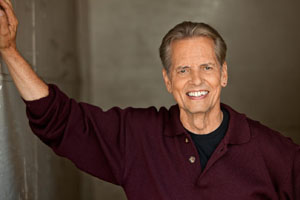
MARK W. TRAVIS is regarded by Hollywood and independent film professionals internationally as the world’s leading teacher and consultant on the art and craft of film directing. He is known as “the director’s director.”
Fueled by the desire to generate organic and authentic performances in an instant, Mark developed his revolutionary Travis Technique™ over a span of 40 years. Not limited to filmmakers, The Travis Technique™ has proven to be an essential set of tools for all storytellers, writers, directors and actors.
Mark Travis has taught at many internationally acclaimed film schools and institutions, including Pixar University, American Film Institute, UCLA Film School, FAS Screen Training Ireland, NISS – Nordisk Institutt for Scene og Studio (Norway), Odessa International Film Festival (Ukraine), CILECT – The International Association of Film and Television Schools, and the Asia Pacific Screen Lab (hosted by Griffith University Film School, Brisbane, Australia).
Productions directed by Mark W. Travis have garnered over 30 major awards, including: an Emmy, Drama-Logue, L.A. Weekly, Drama Critics’ Circle, A.D.A, and Ovation awards.
His film and television directing credits include: The Facts of Life, Family Ties, Capitol, Hillers, and the Emmy Award-winning PBS dramatic special, Blind Tom: The Thomas Bethune Story. Also the feature films Going Under (for Warner Bros. starring Bill Pullman and Ned Beatty), Earlet (documentary), The Baritones, and The 636.
On-stage, over the past 20 years, Mark has directed over 60 theatre productions in Los Angeles and New York, including: A Bronx Tale, Verdigris, The Lion in Winter, Mornings At Seven, Equus, Café 50s, And A Nightingale Sang, Wings, Linke vs. Redfield, The Coming of Stork and others.
Mark is the author of the Number-One Best Seller (L.A. Times), THE DIRECTOR’S JOURNEY: the Creative Collaboration between Directors, Writers and Actors. His second book on directing,
DIRECTING FEATURE FILMS (published in April of 2002) is currently used as required text in film schools worldwide. His third book, THE FILM DIRECTOR’S BAG OF TRICKS: Get What You Want from Writers and Actors was published in 2011. Mark’s popular DVD, HOLLYWOOD FILM DIRECTING, is available now.
MARK TRAVIS and ELSHA BOHNERT offer workshops and consultations on all aspects of storytelling for writers, directors and actors.

MARK TRAVIS and ELSHA BOHNERT offer workshops and consultations on all aspects of storytelling for writers, directors and actors. ELSHA BOHNERT is Chief of Staff of Boyden Road Productions and the director of The Travis Story Center in Los Angeles, California. She is the author of DON’T TRIP OVER THE GARDEN HOSE (Deuxmers 2013). Her stories and poems have been published in literary journals and she is an award-winning visual artist as well, with works in public and private collections throughout the US, Europe, and Japan. Elsha teaches workshops in “Art & Writing for Healing” and is the only teacher authorized by Mark W. Travis to teach the “Write Your Life” Travis Technique™.
Advertisement
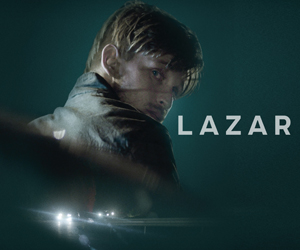
Available now on Vimeo here
Lazar works as a ‘decoy’ or ‘bait’ who distracts the police and oversees the transfer of illegal immigrants across the border with the EU. Intelligent and discreet, he lives under the patronage of a local mobster and is able to support his family with the money he makes from trafficking. He falls in love with a young student, a stranger to his world, and contemplates changing his life. One night, his brother Toni is responsible for the drowning of one of the immigrants. Lazar is called to help and is faced with an impossible decision.
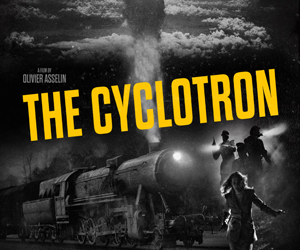
Available now on Google Play here
The Cyclotron is a thriller that takes place at the end of the Second World War. Simone, a spy working for the Allies, is entrusted with the mission to find and execute Emil, a scrupulous Berlin scientist who discovered before the Americans the way to build an atomic bomb, and is fleeing with his secret. Simone finds him on a night train speeding towards Switzerland. German soldiers, led by König, a German scientist, who want to arrest Emil and make him talk before he leaves the country, are also chasing him. Things get complicated when memories of love and quantum mechanics get intertwined in the pursuit.

Available June 15, 2017 on Vimeo here
BNB Hell tells the story of a young woman’s hunt for her missing sister ends at a rundown bed and breakfast in the Hollywood Hills run by an ill-tempered woman called Mommy. Disturbing messages left by former guests suggest unsettling secrets lay buried there.
Show Business is an American comedy that follows screenwriter Guy Franklin as he moves from NYC to LA with his fiancé. It should be a great gig but Guy soon realizes that being in Show Business and balancing his life love is easier said than done – a movie by Composer/Filmmaker Alexander Tovar





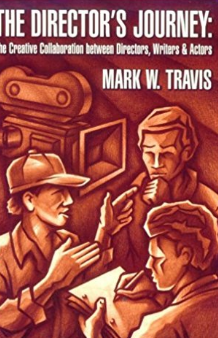

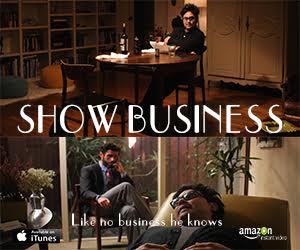




















Pingback: We Were Told Not to Make ‘In the Fade’ – Diane Kruger & Fatih Akin Interview – FilmCourage.com